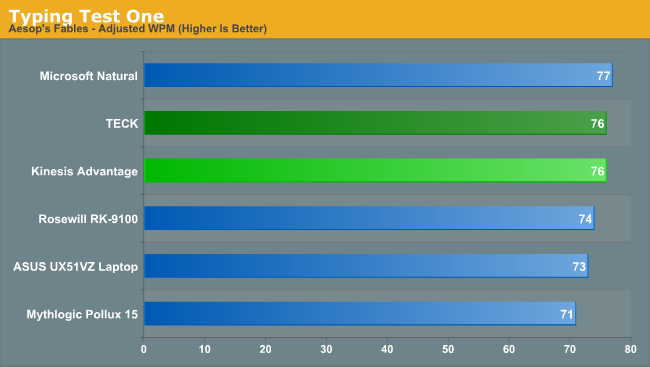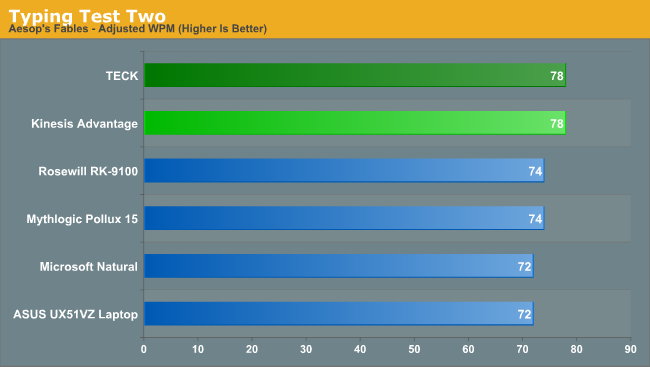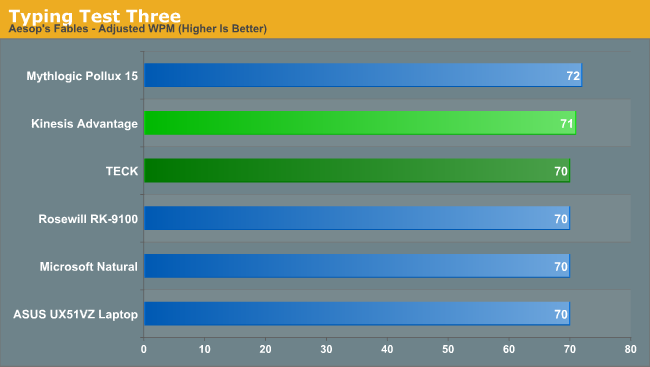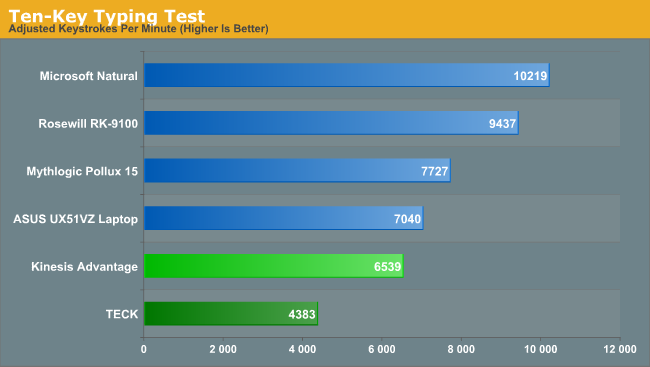Kinesis Advantage Review: Long-Term Evaluation
by Jarred Walton on July 2, 2013 10:15 PM ESTMore Subjective Thoughts and Typing Speed Results
So far I’ve covered a ton of items that may or may not affect individual users, but the real questions are almost certainly not yet covered. Is the Kinesis more comfortable for typing than typical keyboards, is it better than the TECK, and what about typing speed—did it make me a faster typist? I’ll tackle the last item in that list first, as it’s probably the easiest one to answer.
As far as the regular typing tests that I’ve tried on other keyboards, let me first start by saying that I feel like I’m mostly “tapped out” on speed, regardless of what keyboard I happen to be using. I can’t say whether or not Dvorak or some other layout could further improve my speed, but most things I’ve read suggest at best a 5-10% performance in typing speed, and that’s after potential a month or more of training and acclimation to get used to the alternate layout (and some difficulties every time you switch to a system that doesn’t use a Dvorak layout).
What that means for me in particular is that I generally won’t break 80WPM—I just don’t have it in me. I have a sister-in-law who is an accomplished pianist, and she can hit 100+ WPM on a regular keyboard, and I know others that can pull off that feat as well. Personally, 60-70 WPM is plenty fast for what I do, as most of the time I’m sitting at the computer I need to think of what to write more than I wait for my fingers to put thoughts to text.
Since I’ve now tested two ergonomic keyboards along with using regular keyboards and laptops, I can at least make some graphs—hey, it’s AnandTech and I know you all want graphs, right? The margin of error for these sorts of tests is much greater I think, so consider anything within 3 WPM to be essentially a tie. For this roundup, I’ve got my results from the TECK, the Kinesis Advantage, the Rosewill RK-9100, an MS Natural (old model PS/2 connector from about ten years ago), and just for good measure I threw in results using ASUS UX51VZ and Mythlogic Pollux 15 laptops (the latter uses a keyboard similar to the MSI SteelSeries, only on a Clevo chassis).
Given the amount of time I’ve now spent taking the various typing tests, I felt it would be best for me to go back and retake tests on some of the other keyboards, so scores are changed from my previous typing speed articles. I repeated each test multiple times on a keyboard until I felt I had a run that was representative of the best I could reasonably manage—where I’d expect to end up if I used the keyboard as my sole option for a while. I also tried taking the test again on the TECK, and unfortunately even after 20 tries I just wasn’t getting very good results; it seems that a couple months without every day use of the TECK was enough for me to start losing muscle memory of where the keys are located. For the TECK, I used the best results that I obtained when I was at my peak, at the time I finished the TECK review.




At the very least, in what is a less deterministic metric, I seem to consistently top out at around the same point on the various keyboards. In some cases I’m slightly faster on the two mechanical ergonomic keyboards, but overall most of the results are close enough to be considered a tie.
Where I’m absolutely not doing that well on the TECK and Advantage is in 10-key speed, and the laptops with their slightly smaller [0] keys are also suffering. Interestingly, I did best on the 10-key with the old MS Natural—and I confirmed that 10K+ result several times. The Rosewill should be similar, but I consistently scored in the 9000-9500 range (sometimes even dropping into the 8500-9000 range). The absolute best results I got on both the TECK and Kinesis are listed in the charts, and while practice might help me improve I have to be honest: their 10-key implementations leave a lot to be desired. The TECK in particular has the various keys all over the place, while the Kinesis is mostly just a case of being a little different than a typical 10-key.
One nice aspect of the Kinesis 10-key is that the “Keypad” button actually affects more than just the numeric keypad, which can be somewhat useful at times, but more importantly if you plug into a system that has NumLock active you won’t immediately get numbers—the NumLock function of the Kinesis exists separately from the 10-key. So if you want the cursor keys and document navigation keys on the right hand, you can get that functionality.
In terms of speed, then, these high-end ergonomic keyboards don’t appear to add much to my typing speed, but at least after training I’m not any slower. Others are likely to have better/worse results—some will see more, and undoubtedly some will see lower speeds (particularly early on in the use of a new keyboard)—but for the most part typing speed doesn’t seem to change much with keyboard. For speed purposes then, I wouldn’t recommend people go and shell out $200-$300 (or more) on a mechanical ergonomic keyboard, but what about for other benefits?
I feel when using both the TECK and Kinesis that I have to reach and move my hands and fingers around less. Some might say that’s a bad thing (i.e. it might make you more stiff and cause you to tighten up muscles in the hands and fingers), but at least in terms of how it feels I have to say that less stretching to reach keys is more comfortable for me. More comfortable however doesn’t mean that the use of such keyboards is a way to “cure/fix” CTS/RSI/tendonitis issues caused by frequent use of a computer keyboard. Every keyboard I’ve seen carries some form of warning about the risks of extensive typing, with recommendations to take breaks, stretch, etc. The Kinesis and TECK are no different, and if you need to really see about addressing health related concerns brought on by excessive typing, you’ll probably want to look at something that doesn’t require use of a keyboard at all (e.g. Dragon Naturally Speaking).
As for what this means to me personally, I cannot say that my hands and wrists feel substantially better after using either keyboard, but at the same time I would say they’re definitely no worse. Perhaps an MRI or some other diagnosis would be able to shed more light on the subject, but for now I’m willing to leave it be. I enjoyed using both keyboard for various reasons, and I have my gripes about each design as well. Which is better is a matter of preference, but since this is my own review/opinion piece let’s get to the conclusion.










67 Comments
View All Comments
teiglin - Tuesday, July 2, 2013 - link
I almost laughed out loud when I read the second line of your signature after all the noise you made about your age. Cheap shot, I know, but it just struck me as hilarious, especially with the cut-off email address. Even though you're only 10 years older than I am...Fun read though, I switched from a MS ergonomic keyboard to non-ergonomic mechanical a few years ago and have been on-and-off considering something like this. Always useful to read an *experienced* perspective. ;)
praftman - Tuesday, July 2, 2013 - link
Safetype Keyboard and Datahand are the two most radical, yet seemingly valid, keyboard rethinks I've come across.JonnyDough - Wednesday, July 3, 2013 - link
At those prices? No thanks. I'll stick to a regular keyboard. You can get "decent" ones for under $50.Chapbass - Wednesday, July 3, 2013 - link
It all depends on your needs. If you type very often and for long periods of time, then "decent" ones turn out to be "terrible" over the long run, when many start developing RSI problems. Those can end up being a LOT more than $300 for treatment (worst case: surgery) and don't always work. Its much better to get the proper tools to ensure that you can work without issue for many years.The previous generation didn't use computers daily nearly as much as this generation does, so who knows how many people will end up with RSI related injuries in 20-40 years. Better to nip it in the bud before you become a statistic.
greghopenz - Wednesday, July 3, 2013 - link
I have owned a pair of Kinesis keyboards for over 14 years for work station duties, one at home and one at work. Gaming has been with normal keyboards, mostly as I find the layout not conducive to gaming.One finally failed last year, and I replaced it with another modern one with a usb connector (my olds ones have an original fat pc connector to give you some idea of age). I think my ones are not mechanical switches. For a $300 keyboard, I cannot complain about it lasting 12 years. In the interim, I have destroyed many generic pc keyboards, so $30 per year is excellent value.
Other than the chicklet keys, the keyboard is fantastic. I got them when I had oos or rsi issues, and they helped greatly. Replacing the mouse with a trackball was more important, but the ability to rest the weight of your arms on the keyboard really helped.
Murloc - Wednesday, July 3, 2013 - link
I think I would be covered in vomit and tears after reviewing such a keyboard, you're a hero jarred.Ninhalem - Wednesday, July 3, 2013 - link
I understand totally about switching from a regular keyboard to something like the ErgoDox. I'm still trying to sort out hitting the v and b keys.EBSP - Wednesday, July 3, 2013 - link
Thanks for your keyboard reviews. I am finishing my PhD thesis was shopping for an alternative to my MS 4000. After reading your TECK review I decided that it was time to get serious and make a decision. I really wanted to hold off my purchase until after you completed the the Advantage review but ruled it out as an option due to its cost. I settled on the Kinesis Freestyle. I absolutely love being able to reposition each half of the keyboard (right now "G" and "H" are 11" apart) and the key force is just right. I think it is a good compromise between enhanced ergonomics and traditional key layout as it took almost zero adjustment to get used to. I'm excited to read your ErgoDox review.jseliger2 - Wednesday, July 3, 2013 - link
Years ago I got a review model, wrote this: http://jseliger.wordpress.com/2009/07/20/kinesis-a... and then returned the review model. A week or so later I bought one of my own, which I'm typing on right now.I suspect that the improvement between a regular keyboard and the TECK or Advantage is very large, but the marginal improvement between either keyboard for any particular user is pretty small. That is, you get diminishing returns when comparing the TECK or Advantage to each other but very large returns comparing either to a conventional keyboard.
chadrandom - Wednesday, July 3, 2013 - link
Jarred, as it sounds like these keyboard reviews are grinding on you, I'd just like you to know that I really appreciate these mechanical switch ergonomic keyboard reviews. Most all of my friends and colleagues think I'm crazy for going through so many mice and keyboards in effort to find the perfect solution. I've looked into these mechanical switch ergo keyboards but haven't mustered up the courage to trust in the money back guarantees. As such, I've been looking for reviews just like yours to help me determine the best course of action, and your sharing of your experience has been extremely valuable. The ErgoDox looks very interesting for a few different reasons to me, size being one of the important factors to me. I'm looking forward to your review. Again, many thanks for your thorough reviews of important products which are peripheral in a sense, and yet are the principal tool in the human-computer interaction. Cheers.